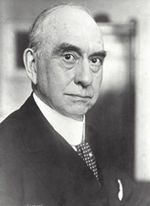Charles W. Waterman, Date of Birth, Place of Birth, Date of Death
TweetCharles W. Waterman
American politician
 Date of Birth: 02-Nov-1861
Date of Birth: 02-Nov-1861
 Place of Birth: Waitsfield, Vermont, United States
Place of Birth: Waitsfield, Vermont, United States
Date of Death: 27-Aug-1932
Profession: lawyer, politician
Nationality: United States
Zodiac Sign: Scorpio 
About Charles W. Waterman
- Charles Winfield Waterman (November 2, 1861 – August 27, 1932) was a Colorado attorney and politician.
- He is most notable for his service as a United States Senator from Colorado. Born in Waitsfield, Vermont, Waterman graduated from the University of Vermont in 1885 and taught school before attending the University of Michigan Law School.
- Following his 1889 graduation, Waterman moved to Denver, where he became a successful corporate and railroad attorney and was active in politics as a Republican.
- After serving as a delegate to the 1916 Republican National Convention and running unsuccessfully for the Republican U.S.
- Senate nomination in 1918, Waterman was the Colorado manager for Calvin Coolidge's 1924 presidential campaign.
- After Coolidge won, he appointed Waterman general counsel for the federal Oil Conservation Board.
- He was a delegate to the 1924 Republican National Convention, and later that year ran unsuccessfully for the U.S.
- Senate in a special election, losing the Republican nomination for a two-year term to Rice W.
- Means, who went on to win the general election. In 1926, Waterman defeated Means for the Republican nomination for a full six-year term.
- He defeated Democrat William Ellery Sweet in the general election, and served from 1927 until his death.
- Waterman became ill in 1932, and announced that he would not be a candidate for reelection later that year.
- His health continued to worsen, and he died in Washington, DC on August 27.
- He was buried at Cedar Hill Cemetery in Suitland, Maryland. Waterman was also a noted philanthropist; in addition to creating a charitable fund for Colorado attorneys, he donated a substantial amount to the University of Vermont, including funds for the construction of a campus building named for Waterman and his wife.
Read more at Wikipedia
See Also
- Famous People's Birthdays on 02 November, United States
- Famous People's Birthdays in November, United States
- Famous lawyer's Birthdays on 02 November, United States
- Famous lawyer's Birthdays in November, United States
- Famous politician's Birthdays on 02 November, United States
- Famous politician's Birthdays in November, United States

